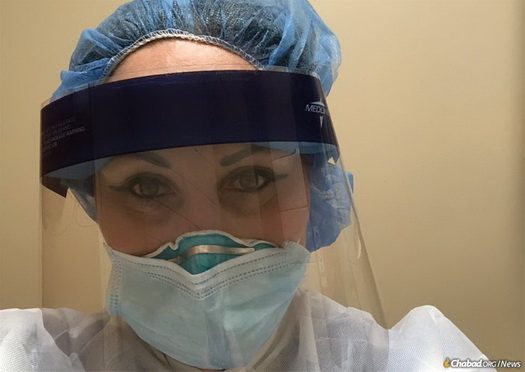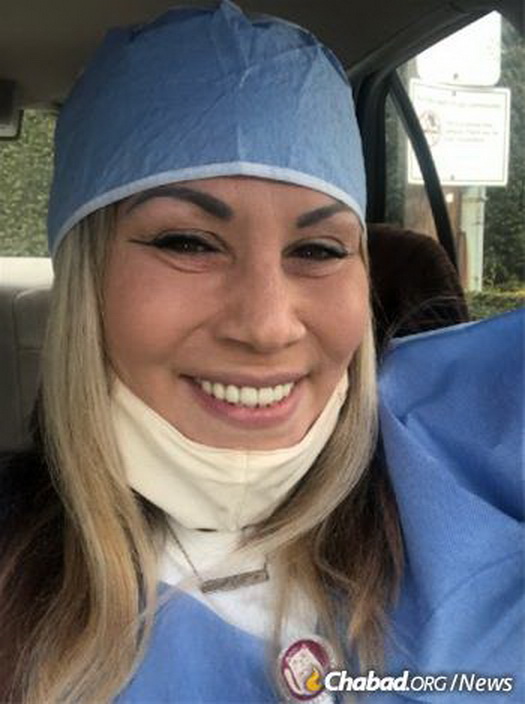
How ‘Torah Breaks’ Help One COVID Nurse Draw Strength and Calm in Chaos
by Nancy Hochman – chabad.org
Some people say that the ability to willingly and selflessly give to others is a heroic attribute, characteristic of many first responders working with COVID-19 patients. But Lori Hope Gilman-Smith, who goes by her Hebrew name, Elisheva, doesn’t consider herself a hero. Instead, she credits her deep faith in G‑d, as well as all the people who have accompanied her on her two-and-a-half-year Jewish spiritual journey, for broadening her view and helping her make it through each day at an overburdened COVID-19 unit at Mount Sinai South Nassau Hospital in Oceanside, N.Y.
When Gilman-Smith began to feel overwhelmed by the scope and demands of her job—and more so her patients’ suffering—she began to take “Torah breaks,” she told Chabad.org. “It was the online Chabad classes, videos and chats that kept me going,” she recounted.
She would spend her lunch hour praying. The lessons she drew from her prayers and Torah learning gave her the strength to carry out her job for an hour or two until she would take another short break. When the weight of her job felt like more than she could handle, she drew spiritual comfort from speaking with her rabbi, Rabbi Eli Goodman, co-director with his wife, Beila, of Chabad of the Beaches in Long Beach, N.Y. These breaks, she said, helped her become the best practitioner she could be for the patients under her care.
“It used to be all about me,” shared Gilman-Smith. “Although I’ve always believed in G‑d, I was looking for G‑d to do my will, instead of me doing His.”
She became a ba’alat teshuvah (one who has returned to Jewish observance) about two-and-a-half years ago, with support from her work colleagues, cardiologists Dr. David Weinstock and Dr. Joseph Eichenbaum.
Gilman-Smith’s 15-year-long career as a technician at the off-site cardiovascular/infectious-disease practice (now affiliated with Mount Sinai South Nassau) took an unexpected turn into critical care when she and her fellow health-care professionals at her practice were asked to assist at an under-staffed COVID-19 unit at the hospital.
An Often Solitary Advocate for Isolated Patients
Although concerned with her own well-being, with support from the medical-practice physicians for whom she worked and her religious community, she figured that the call was also part of G‑d’s will. “It’s what I signed up for, even if that role turned out different than what I expected,” she said.
Gilman-Smith’s close-contact tasks at the makeshift COVID-19 ward at Mount Sinai involved taking and storing vials of patient’s blood, checking patients’ vital signs, assisting nurses in distributing medications, changing diapers and doing “anything else she was asked to do.”
She quickly realized that, considering the extraordinary circumstances of the novel virus, the hospital’s ban on visitors left these vulnerable patients without any personal advocates and their needs, sometimes overlooked. While aware that her presence in the ward was only temporary, she nevertheless decided to give the patients the maximum care she could provide as long as she was available to do so.
Gilman-Smith fully dedicated herself to her patients’ needs to help counter the inevitable lapses in attention by the overworked hospital staff. She felt that she was contributing a personal G‑d-given imprint towards improving the health and comfort of those stricken with the coronavirus. “There was nothing that I wouldn’t do to let them know how much I cared,” she said.
In addition, she felt that she was reaping personal rewards. “The gratification I received from making each patient a little more comfortable was so amazing,” she said.
One patient, concerned with disturbing the already haggard hospital staff, had asked her son to deliver her food. Hospital procedures required that such deliveries be left with hospital security, and with the package overflow, it sometimes took hours until they were delivered to the patients. When Gilman-Smith heard that this woman was hungry, she personally went to retrieve the food for “her” patient, even though that person would soon become someone else’s responsibility.
The Little Acts Add Up
There were other contributions and interactions that Gilman-Smith considered minor but doubts that she will ever forget, including teaching a patient how to access FaceTime to video conference loved ones, and the smile that lit up the patient’s face when she and her family members connected virtually.
Gilman-Smith made frequent visits to an elderly patient whom she noticed had a kippah lying on his bed. She returned it to its rightful place on the man’s head each of the many times it fell off. The man had not uttered one word over the three-day period that Gilman-Smith spent time talking to him; that is, until she told him that “Pesach was coming.”
“Pesach,” he repeated with longing, as his warm gaze met those of his newfound friend.
Then there was the time she entered the room of a 54-year-old man, and noticed he had wet and soiled himself. With a warm smile to counter any embarrassment he might be experiencing, she asked if he would mind if she changed him.
“I’ll wash you down, and you’ll feel better,” she said. Even though the man was heavy and no other staff were available to help, she was determined to keep him from waiting. As she managed to turn him over and began the process, tears of gratitude flooded the man’s eyes, as if he was being granted a great gift (and perhaps he had been.)
Ultimately, all the little acts began to add up, and no longer seemed insignificant.
Faith in G‑d, Support From Community
It was her faith in G‑d, and a supportive Jewish community, she said, that provided Gilman-Smith with the key to access her inherent courage: to embrace head-on the task of caring for a hospital ward full of the very ill, if only temporarily, and treat them as if they were family.
At the end of her first week working in the COVID-19 ward, Gilman-Smith felt unwell. She was expressing the typical symptoms of the coronavirus: shortness of breath, fever and severe chest pains. She was tested for the bug, though the results turned out negative. Aware that the test was often unreliable, she asked to be tested a second time through the hospital’s Employee Health Division. “The nurse said, I’ll call you with the results, but I’m very worried about you.”
The results of her second test were also negative. Nonetheless, the cardiologists and infectious-disease doctors for whom she worked insisted that she take a week of sick leave to rest at home and regain her strength. Still unsure if she had contacted the virus, she had herself tested for Covid-19 antibodies, a test that is also not entirely reliable. Although this test, too, came out negative, Gilman-Smith remained unsure whether or not she had contacted the coronavirus.
Either way, she believes that her faith and love for G‑d was protecting her. “I was on top of these patients; I walked out. I’m here. I’m OK. I’m still able to wake up every day and help do something positive,” she said.
Gilman-Smith is now back at the cardiology practice (which, she says, is in some ways more difficult than working at the hospital.) “In the hospital, you knew what you were dealing with. Here, we have to treat everyone as if each is positive (a carrier of the virus). We won’t allow people to bring a spouse into the office; (we) isolate patients and wear protective gear. Certain things have to change, and I’ll change with them,” she said. “COVID’s out there still. And patients are still coming in.”
For patients under a coronavirus-based quarantine, or those who are simply too afraid to go out and who need heart medication, Gilman-Smith makes home deliveries while wearing Personal Protective Equipment and usually stays for a while to speak with the patients, who have now become her friends.
Would Gilman-Smith—like many medical professionals, each a hero in their own right—return to a hospital’s Covid-19 ward if she is called upon?
She didn’t hesitate for a moment: “I would go back there tomorrow if they needed me to.”











